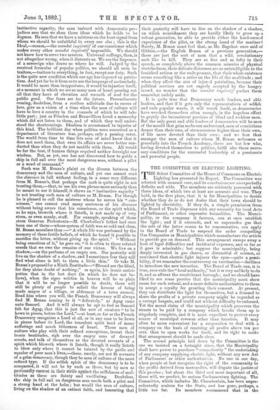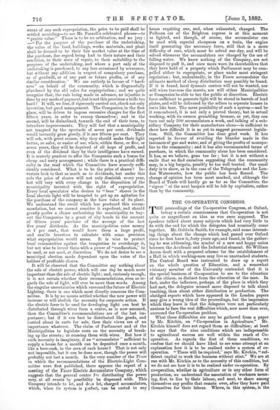THE COMMITTEE ON ELECTRIC LIGHTING.
THE Select Committee of the House of Commons on Electric Lighting has presented its Report. The Committee was selected with unusual care, and its conclusions are unexpectedly
definite and wide. The members are evidently possessed with three ideas, of which two at least are accurate and wise. They hold, in the first place, that it is for Muncipalities to decide whether they do or do not desire that their town should be lighted by electricity. If they do, a simple permission from the Board of Trade dispenses with any necessity for local Acts of Parliament, or other expensive formalities. The Munci- pality, or the company it favours, can at once establish
the light ; and if it succeeds, and so supersedes gas that
the sale of the latter ceases to be remunerative, can apply to the Board of Trade to suspend the order compelling Gas Companies or Municipalities which manufacture the article
to provide gas on demand. This arrangement sweeps away a host of legal difficulties and incidental expenses, and so far as
it goes is admirable ; but suppose the municipality, being deeply interested in gas shares, or distrustful of science, or convinced that electric light injures the eyes—quite a possi- bility, if we remember the controversy on vaccination—declines to introduce the new invention. The Board of Trade can, it is true, over-rule the "local authority," but it is very unlikely to do it, and so affront the recalcitrant borough ; and we should have liked to see some proviso that the municipality must show cause for such refusal, and a more definite authorisation to them to accept a royalty for granting their consent. At present, they can distribute the light for themselves, but a demand to share the profits of a private company might be regarded as a corrupt bargain, and could not without difficulty be enforced. Yet the moral claim of the municipality which preserves the streets to be paid by a company which breaks them up is singularly complete, and it is most expedient to protect every source of municipal revenue other than taxation. It may often be more convenient for a corporation to deal with a company on the basis of receiving all profits above ten per cent. than to open works for itself, and its right to make that arrangement should be made clear.
The second principle laid down by the Committee is the one we insisted on a fortnight since, that the Municipality shall have power to purchase " compulsorily " the undertaking of any company supplying electric light, without any new Act of Parliament or other authorisation. No one in our day, IA hen people at last recognise the light of the community to the profits derived from monopolies, will dispute the justice of this proviso ; but about the third and most important of all, there will, we predict, be serious Parliamentary fighting. The Committee, which includes Mr. Chamberlain, has been unpre- cedentedly zealous for the State, and has gone, perhaps, a little too far. Its members recommend that in the event of any such expropriation, the price to be paid shall be settled according—to use Mr. Parnell's celebrated phrase—to " prairie value." There is to be no arbitration, and no jury : —" For the purpose of the purchase of the undertaking, the value of the land, buildings, works, materials, and plant
shall be deemed to be their fair market value at the time of
the purchase, due regard being bad to their nature and their condition, to their state of repair, to their suitability to the purposes of the undertaking, and where a part only of the undertaking is purchased, to any loss occasioned by severance, but without any addition in respect of compulsory purchase, or of goodwill, or of any past or future profits, or of any similar consideration." We are entirely in favour of " hard- ness " on behalf of the community, which is disgracefully plundered by the old rules for expropriation ; and we quite recognise that, the rule being made in advance, no injustice is done by any mode of payment, but is not this provision a trifle too hard ? It will, we fear, if rigorously carried out, check not only invention, but good management. The Companies, in the first place, will be driven to impose excessive charges for the first fifteen years, in order to recoup themselves ; and in the second, will be disinclined, towards the end of their term, to introduce improvements. They will feel that a municipality not tempted by the spectacle of seven per cent. dividends would instantly grow greedy, if it saw fifteen per cent. They will ask, with great reason, why they should make their light better, or safer, or easier of use, when, within three, or five, or seven years, they will be deprived of all hope of profit, and even of the dividend they by their intelligence have earned.
It is scarcely prudent to offer the Companies such a bonus for cheap and nasty management ; while there is a practical diffi- culty in the road which the Committee have scarcely suffi- ciently considered. What is to be the price of shares ? In- vestors look to that as much as to dividends, but under this rule the price of shares will not only diminish every year, but will vary with every change in the disposition of the municipality invested with the right of expropriation.
Every local speculator who desires to " bear " shares in the local electric light will be tempted to get up an agitation for the purchase of the company at the bare value of its plant. We understand the recoil which has produced this recom- mendation, but we cannot consider it expedient, and should greatly prefer a clause authorising the municipality to buy- out the Companies by a grant of city bonds to the amount of fifteen years' purchase of the average of the last five years' dividends. As the municipalities raise money
at 4 per cent., that would leave them a large profit,
and enable investors to calculate with some precision what expropriation would mean. It is wise to protect local communities against the temptation to overcharge it, but not wise to invest them with a power of "confiscation," to be used, or not used, at discretion. We do not desire to see a municipal election made dependent upon the votes of the holders of profitable shares.
It will be observed that the Committee say nothing about the sale of electric power, which will one day be much more important than the sale of electric light; and, curiously enough, it is not certain whether their recommendations, even as re- gards the sale of light, will ever be more than words. Among the singular uncertainties which surround the future of Electric Lighting, there is one which most directly concerns the Com- mittee. It is by no means settled whether the new power will increase or will abolish the necessity for corporate action. If the electric force to be used for developing light can best be distributed through wires from a centre, as is now assumed, then the Committee's recommendations are of the last im- portance; but if it can best be distributed like goods, and carried about in carts for sale, then their views are of no importance whatever. The claim of Parliament and of the Municipalities to legislate rests on the necessity of break- ing up the streets ; or crossing them with wires. But how if such necessity is imaginary, if an " accumulator " sufficient to supply a house for a month can be deposited once a month, like a beer-cask, in the area of each house I That is not only not impossible, but it can be done now, though the power will
probably not last a month. In the very number of the Times
in which the recommendations of the Electric-Light Com- mittee were first published, there appears the report of a
meeting of the Faure Electric Accumulator Company, which suggests that the general centre f'z distributing the power may, at all events by possibility be dispensed with. This Company intends to let, and dcza let, charged accumulators, which, when its system is parfect, can be carted to any house requiring one, and, when exhausted, changed. The Pullman car of the Brighton express is at this moment so lighted, and though, of course, the accumulator can be used with especial cheapness on a train, the engine itself generating the necessary force, still that is a mere difficulty of cost, which must be solved one day, and will be solved whenever the accumulators are charged by the use of falling water. We know nothing of the Company, are not disposed to puff it, and once more warn its shareholders that they have hold of a property which Parliament may be com- pelled either to expropriate, or place under most stringent regulation ; but, undoubtedly, in the Faure accumulator the ultimate method of cheap distribution may possibly be found. If it is found, local dynamic centres will not be wanted, nor will wires traverse the streets, nor will either Municipalities or Companies be able to tax the public at discretion. Electric force sufficient to generate light will be stored in barrels of lead plates, and will be delivered by the sellers to separate houses in carts like beer. The mere possibility of such a system—and be it remembered, it is not only a proved theory, but in actual working, with its owners grumbling because, as yet, they can turn out only 300 accumulators a week, and talking of a sub- sidiary Company for their manufacture alone—is sufficient to show how difficult it is as yet to suggest permanent legisla- tion. Still, the Committee has done good work. It has reported in favour of avoiding the blunder made in the instances of gas and water, and of giving the profits of monopo- lies to the community ; and it has also recommended terms of purchase, in which the community alone has been considered. It has, as we believe, gone too far ; but it is not without a smile that we find ourselves suggesting that the community may, in a big bargain, possibly be too well treated. Our usual duty is to show, as in the case of the Telegraphs and the Lon- don Waterworks, how the public has been fleeced. The change of opinion has been most marked, and although the Board of Trade will hardly go as far as the Committee, the "rigour " of the next bargain will be felt by capitalists, rather than by the community.















































 Previous page
Previous page